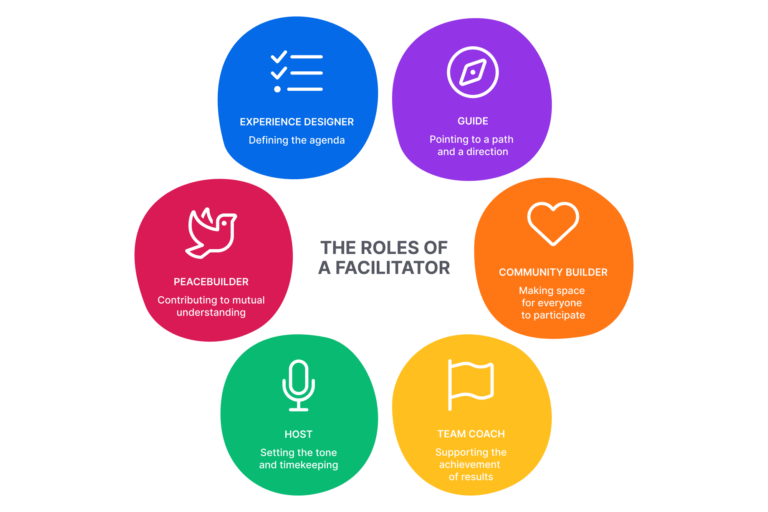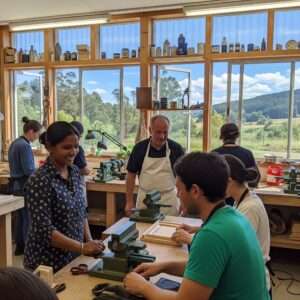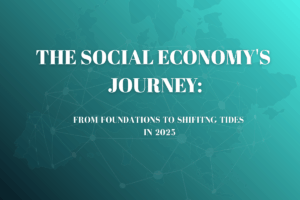In the framework of the Social and Solidarity Economy (SSE), the role of the Social Facilitator (SF) is of central importance. Social facilitators act as enablers of inclusive and participatory processes, ensuring that individuals, particularly those from vulnerable or marginalised groups, can engage meaningfully in collective learning and entrepreneurship. Rather than positioning themselves as traditional teachers or trainers, they guide participants in co-creating solutions, building trust, and fostering collaboration.
The work of a social facilitator is therefore not primarily about transferring knowledge but about creating the conditions under which knowledge, skills, and experiences can be shared and developed collectively. Through careful moderation, active listening, and the application of participatory methods, facilitators help groups to articulate their ideas, overcome barriers, and translate aspirations into structured action. Their presence ensures that group processes remain inclusive, constructive, and focused on generating sustainable outcomes that reflect both social and economic goals.
The CREASSE project, recognises that tools and resources alone are not enough to make change happen. What truly makes the difference is the human element: skilled facilitators who guide groups through uncertainty, help resolve conflict, and encourage participants to take ownership of their learning and entrepreneurial journey.
That is why CREASSE has dedicated an entire module in its Handbook for Facilitators to the role of the SF. This module introduces facilitators to essential competences such as:
- Active listening and empathy, to ensure all voices are heard.
- Non-Violent Communication (NVC), to de-escalate conflict and promote respectful dialogue.
- Shared leadership approaches, encouraging groups to rotate roles and take joint responsibility.
- Inclusive facilitation methods, like dot-voting or circle processes, which ensure that decisions are made collectively and transparently.
Through these methods, facilitators act as bridges: between participants and opportunities, between personal ideas and collective projects, and between challenges and sustainable solutions.
Across Europe, the power of social facilitation can be seen in practice:
- Cyprus – Hub Nicosia’s Social Café: Here, facilitators work with migrant women, creating safe spaces where they can build skills, share stories, and support one another in preparing for employment or entrepreneurship. Without facilitators, many women would feel excluded or hesitant to participate.
- Spain – Women’s Entrepreneurship Circles in Andalusia:
Facilitators used storytelling and empathy circles to help women identify entrepreneurial strengths, overcoming barriers of self-doubt and cultural marginalisation.
These examples show how facilitation transforms passive participation into active community leadership.
In today’s context of social exclusion, economic precarity, and political division, facilitators are more important than ever. They help groups navigate differences, build trust across cultures, and channel collective energy into tangible social enterprises. By doing so, they contribute directly to the goals of the SSE and to broader global objectives like the United Nations Sustainable Development Goals (SDGs), from reducing inequalities (SDG 10) to promoting decent work and sustainable communities (SDGs 8 and 11).
A Catalyst for Change
For CREASSE, investing in facilitators means investing in the future of inclusive entrepreneurship. They are the catalysts that help turn scattered ideas into actionable projects, and hesitant individuals into confident community leaders.
By placing social facilitators at the heart of its methodology, CREASSE ensures that entrepreneurship is not only about economic activity but about building resilient and caring communities. The presence of skilled facilitators helps participants to overcome self-doubt, embrace diversity, and work collectively toward shared goals. In doing so, they enable groups to design initiatives that generate both social impact and economic sustainability.
The project’s vision is to foster a new generation of community leaders who are equipped with the skills, attitudes, and values to transform challenges into opportunities. With facilitators guiding the process, ideas are not left on paper, they are tested, refined, and brought to life in ways that strengthen the local social fabric and contribute to Europe’s broader transition towards fairness, solidarity, and sustainability.





